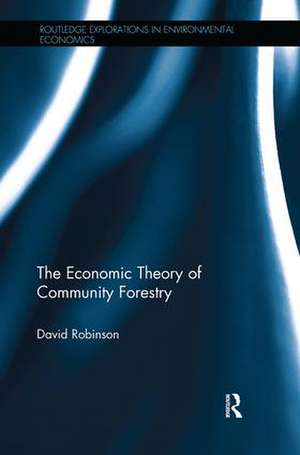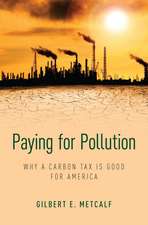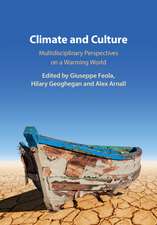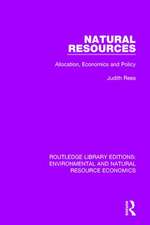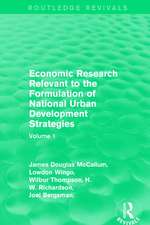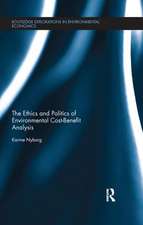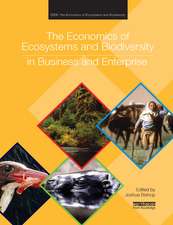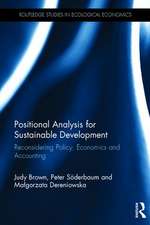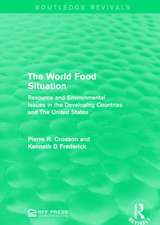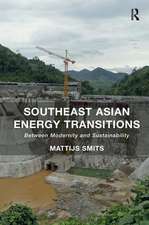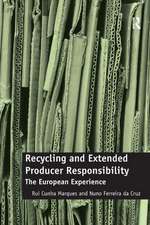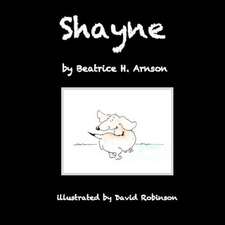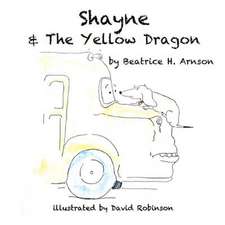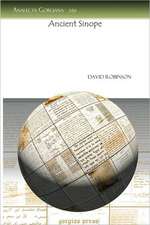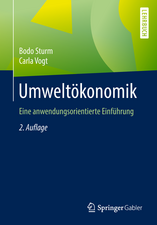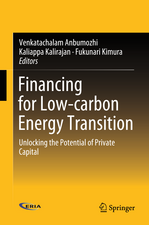The Economic Theory of Community Forestry: Routledge Explorations in Environmental Economics
Autor David Robinsonen Limba Engleză Paperback – 27 apr 2018
The Economic Theory of Community Forestry aims to address this gap and provides the tools for understanding community forestry movement as an alternative form of ownership that can mobilize community resources and encourage innovation. It uses a wide range of economic principles to show how community forestry can be economically superior to conventional forestry; provides examples from Canadian practice; and discusses the regulatory regime that policy makers must put in place to benefit from community forestry.
This book will be of interest to policy makers, activists, community forestry managers and members, foresters and forestry students.
| Toate formatele și edițiile | Preț | Express |
|---|---|---|
| Paperback (1) | 411.42 lei 6-8 săpt. | |
| Taylor & Francis – 27 apr 2018 | 411.42 lei 6-8 săpt. | |
| Hardback (1) | 700.75 lei 6-8 săpt. | |
| Taylor & Francis – 2 iun 2016 | 700.75 lei 6-8 săpt. |
Din seria Routledge Explorations in Environmental Economics
-
 Preț: 311.58 lei
Preț: 311.58 lei -
 Preț: 311.18 lei
Preț: 311.18 lei -
 Preț: 314.71 lei
Preț: 314.71 lei - 25%
 Preț: 823.26 lei
Preț: 823.26 lei - 18%
 Preț: 1053.92 lei
Preț: 1053.92 lei -
 Preț: 424.58 lei
Preț: 424.58 lei - 15%
 Preț: 431.75 lei
Preț: 431.75 lei - 17%
 Preț: 289.78 lei
Preț: 289.78 lei - 18%
 Preț: 1403.97 lei
Preț: 1403.97 lei - 28%
 Preț: 827.23 lei
Preț: 827.23 lei -
 Preț: 329.92 lei
Preț: 329.92 lei - 18%
 Preț: 1223.61 lei
Preț: 1223.61 lei -
 Preț: 420.30 lei
Preț: 420.30 lei - 26%
 Preț: 848.93 lei
Preț: 848.93 lei - 18%
 Preț: 1272.54 lei
Preț: 1272.54 lei - 25%
 Preț: 797.37 lei
Preț: 797.37 lei - 18%
 Preț: 1288.46 lei
Preț: 1288.46 lei -
 Preț: 416.05 lei
Preț: 416.05 lei -
 Preț: 279.72 lei
Preț: 279.72 lei -
 Preț: 378.43 lei
Preț: 378.43 lei - 18%
 Preț: 1286.01 lei
Preț: 1286.01 lei -
 Preț: 422.04 lei
Preț: 422.04 lei - 18%
 Preț: 1061.93 lei
Preț: 1061.93 lei - 18%
 Preț: 1060.25 lei
Preț: 1060.25 lei -
 Preț: 493.80 lei
Preț: 493.80 lei - 18%
 Preț: 1336.46 lei
Preț: 1336.46 lei - 18%
 Preț: 1065.06 lei
Preț: 1065.06 lei - 26%
 Preț: 821.46 lei
Preț: 821.46 lei - 25%
 Preț: 1022.48 lei
Preț: 1022.48 lei - 18%
 Preț: 1226.37 lei
Preț: 1226.37 lei -
 Preț: 393.26 lei
Preț: 393.26 lei -
 Preț: 418.22 lei
Preț: 418.22 lei - 28%
 Preț: 824.53 lei
Preț: 824.53 lei - 18%
 Preț: 1169.16 lei
Preț: 1169.16 lei - 18%
 Preț: 1380.52 lei
Preț: 1380.52 lei -
 Preț: 485.61 lei
Preț: 485.61 lei - 18%
 Preț: 1285.17 lei
Preț: 1285.17 lei -
 Preț: 398.44 lei
Preț: 398.44 lei - 18%
 Preț: 1067.84 lei
Preț: 1067.84 lei - 12%
 Preț: 303.64 lei
Preț: 303.64 lei
Preț: 411.42 lei
Nou
Puncte Express: 617
Preț estimativ în valută:
78.74€ • 81.90$ • 65.00£
78.74€ • 81.90$ • 65.00£
Carte tipărită la comandă
Livrare economică 15-29 aprilie
Preluare comenzi: 021 569.72.76
Specificații
ISBN-13: 9781138599338
ISBN-10: 1138599336
Pagini: 230
Ilustrații: 88
Dimensiuni: 156 x 234 x 12 mm
Greutate: 0.34 kg
Ediția:1
Editura: Taylor & Francis
Colecția Routledge
Seria Routledge Explorations in Environmental Economics
Locul publicării:Oxford, United Kingdom
ISBN-10: 1138599336
Pagini: 230
Ilustrații: 88
Dimensiuni: 156 x 234 x 12 mm
Greutate: 0.34 kg
Ediția:1
Editura: Taylor & Francis
Colecția Routledge
Seria Routledge Explorations in Environmental Economics
Locul publicării:Oxford, United Kingdom
Public țintă
Postgraduate and UndergraduateCuprins
Contents
Foreword
1 The Plan of the Book
I SETTING THE SCENE
2 What is Community Forestry?
3 Traditional Territories, Industrial Forestry, and the Community Forest
4 Tenure, Property Rights, Community Rights
II ECONOMIC THEORY
5 Forests and Joint Production
6 Human Capital and Social Capital
7 The Efficiency of Community Forestry
8 Externalities and Community Forestry
9 Public goods and public forests
III COMMUNITY
10 Transaction cost theory applied to community forestry
11 The Creative Potential of Community Forestry: the small world phenomenon
12 Coops, worker managed firms and community forests
13 Community Forestry and the Professional Forester
14 Conclusions and Policy Advice
Appendices
Foreword
1 The Plan of the Book
I SETTING THE SCENE
2 What is Community Forestry?
3 Traditional Territories, Industrial Forestry, and the Community Forest
4 Tenure, Property Rights, Community Rights
II ECONOMIC THEORY
5 Forests and Joint Production
6 Human Capital and Social Capital
7 The Efficiency of Community Forestry
8 Externalities and Community Forestry
9 Public goods and public forests
III COMMUNITY
10 Transaction cost theory applied to community forestry
11 The Creative Potential of Community Forestry: the small world phenomenon
12 Coops, worker managed firms and community forests
13 Community Forestry and the Professional Forester
14 Conclusions and Policy Advice
Appendices
Notă biografică
David Robinson teaches resource economics, econometrics and game theory in the School of Northern and Community Studies at Laurentian University in Northern Ontario, Canada.
Descriere
Community forestry is an expanding model of forest management around the world. Over a quarter of forests in developing countries are now owned by or assigned to communities and there is a growing community forestry movement in developed countries such as Canada and the USA. There is, however, no economic theory of community forestry and no systematic treatment of the potential economic advantages of promoting Community forestry in developed countries. The Economic Theory of Community Forestry aims to address this gap and provides the tools for understanding community forestry movement as an alternative form of ownership that can mobilize community resources and encourage innovation.
